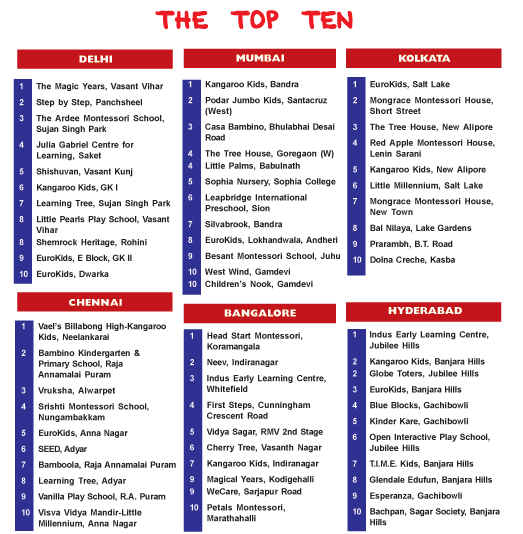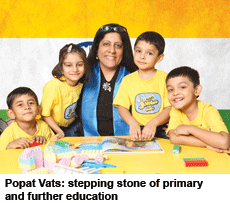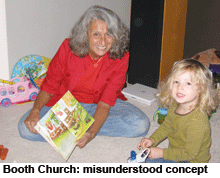For the EW India Preschool Rankings 2012, 2,284 respondents comprising SECA parents, principals and teachers in six major cities where there’s sufficient awareness of the vital importance of quality preschool education, were polled by the well-known market research firm C fore. Dilip Thakore & Summiya Yasmeen report

For a rising number of young middle class parents in urban — especially metropolitan — India, the year-end festive and holiday season is clouded by the annual rush for nursery admission forms doled out in December-January. Although the preschool academic year begins in June/July, the admissions process begins with registration forms issued by the country’s most highly reputed preschools in these winter months. During the often cruel winter season, it’s routine for Delhi-based newspapers and television news channels to showcase mile-long queues of anxious parents camping beyond the gates of the national capital’s reputed nursery schools. Queueing is necessary because registration forms priced between Rs.100-500 could run out with many preschool managements printing a minimal number to avoid the onerous task of processing thousands of forms for the usually less than 100 seats available for children aged between three-six in the average nursery.
“For the past half century and more, early childhood education (ECE) has not been taken seriously in India. Although India’s upwardly mobile and educated middle class fully appreciates the value of structured ECE — and this is reflected in the flood of admission applications in the most reputed preschools — the Central government adamantly refuses to transform its 1 million-plus anganwadis into ECE centres. Now with all sections of society — not only the urban middle class — beginning to appreciate that ECE is the stepping stone of primary and further education, the government should rope in the large and growing number of branded companies which provide ECE under the franchise model, to begin providing preschool education in anganwadis. This is the prescription for reaping India’s much discussed but still neglected demographic dividend,” says Swati Popat Vats, president of the Podar Jumbo Kids network of 157 owned and franchised preschools and promoter-president of the Early Childhood Association (estb. 2010), India’s pioneer association of ECE stakeholders (preschools, teachers, educators, corporates and NGOs) with a membership of over 450.
Also read: Early childhood care & education – Swati Popat Vats
 Most ECE educators are grateful that the preschool education sector is not subject to the jurisdiction and unwanted ministrations of notoriously venal, bull-in-china-shop bureaucrats and inspectors of the Central, state and local governments who have ruined the high-potential schools and higher education systems of post-independence India. Under the law, any individual can establish and run a nursery school, and with both parents obliged to work to make ends meet in the persistently inflationary Indian economy, preschool education is attracting a growing number of entrepreneurs with much more than the early childhood education and welfare of India’s cheerful and uncomplaining infants on their mind.
Most ECE educators are grateful that the preschool education sector is not subject to the jurisdiction and unwanted ministrations of notoriously venal, bull-in-china-shop bureaucrats and inspectors of the Central, state and local governments who have ruined the high-potential schools and higher education systems of post-independence India. Under the law, any individual can establish and run a nursery school, and with both parents obliged to work to make ends meet in the persistently inflationary Indian economy, preschool education is attracting a growing number of entrepreneurs with much more than the early childhood education and welfare of India’s cheerful and uncomplaining infants on their mind.
Consequently, the courts have had to step in to decree several governance norms for preschools. Thus interviews and testing of tiny tots have been proscribed and restrictions imposed even upon parent interviews. Moreover, admission preference for households in the neighbourhood of preschools has been ruled by the courts, although in typical sub-continental style court decrees are practiced more in the breach than observance. Therefore within India’s over-hyped learning-proof middle class and the self-serving bureaucracy, there is growing clamour for government regulation of preschool education. Kapil Sibal, hitherto Union human resource development minister (who in early November mercifully vacated Shastri Bhavan, Delhi which houses the top brass of this consistently disappointing ministry), had made plain an intent to extend the ambit of the Right to Free and Compulsory Education (aka RTE) Act, 2009 to preschool and secondary education, which remedy may prove worse than the disease(s) it’s meant to cure.
Be that as it may, ever since EducationWorld was launched at the turn of the new century to receive a hostile welcome from the congenitally education-resistant captains of industry and unpoliced babus of the HRD and state-level education ministries, your editors have been cognizant of the vital importance of early childhood (aka preschool) education which prepares infants for primary and further education. Thus even while impressing the need for upgradation of preschool infrastructure and pedagogies upon our core readership segm-ents — urban school managements, parents and teachers — we have been strongly but vainly, advocating conversion of the country’s 1.6 million anganwadis — mother and child nutrition centres — into fully-fledged preschools providing contemporary early childhood education to India’s estimated 100 million cruelly neglected infants in rural and urban blight habitats.
Moreover, in pursuance of the socially beneficial objective of popularising preschool education, since 2010 EducationWorld has been publishing its annual India Preschool Rankings (formerly India’s Most Admired Preschools Rankings) which evaluate the Top 20 preschools in six major cities countrywide followed by an annual Early Childhood Education Global Conference at which globally renowned ECE experts have been featured as keynote speakers.
In keeping with this tradition and to continue to impress the vital importance of structured ECE upon the public and official consciousness, in early October we once again commissioned the well-known Delhi-based market research and public opinion polling agency Centre for Forecasting Pvt. Ltd (C fore), to constitute a sample respondents’ base comprising parents of preschool children, ECE teachers and educationists in six major cities (Delhi, Mumbai, Chennai, Kolkata, Bangalore and Hyderabad) in which there is sufficient awareness of the value of structured preschool education to rate and rank the Top 20 preschools in each.
 Accordingly, 100 C fore field researchers spread across the four metros and two quasi-metros countrywide and interviewed 2,284 SEC A (socio-economic category A) respondents, i.e with monthly household income of Rs.30,000 plus, to rate the Top 20 preschools from a list of the most well-known ECE centres in their city. “Every respondent was shown a list of pre-selected preschools in his/her city and was asked to rate those they were aware of on a ten-point scale against ten parameters. The parameters of assessment are competence of faculty, teacher welfare and development, infrastructure, individual attention to children, value for money, leadership/management quality, parental involvement, innovative teaching, safety and hygiene and special needs education. All parameters are given equal importance except ‘competence of teachers’ which is conferred double weightage. Preschools assessed by less than 30 respondents were eliminated from the rankings,” explains Premchand Palety, the highly-reputed promoter-chief executive of C fore (estb. 2000) which conducts market research surveys and opinion polls for the Hindustan Times and CNBC TV 18 among other publi-cations as also for several political parties.
Accordingly, 100 C fore field researchers spread across the four metros and two quasi-metros countrywide and interviewed 2,284 SEC A (socio-economic category A) respondents, i.e with monthly household income of Rs.30,000 plus, to rate the Top 20 preschools from a list of the most well-known ECE centres in their city. “Every respondent was shown a list of pre-selected preschools in his/her city and was asked to rate those they were aware of on a ten-point scale against ten parameters. The parameters of assessment are competence of faculty, teacher welfare and development, infrastructure, individual attention to children, value for money, leadership/management quality, parental involvement, innovative teaching, safety and hygiene and special needs education. All parameters are given equal importance except ‘competence of teachers’ which is conferred double weightage. Preschools assessed by less than 30 respondents were eliminated from the rankings,” explains Premchand Palety, the highly-reputed promoter-chief executive of C fore (estb. 2000) which conducts market research surveys and opinion polls for the Hindustan Times and CNBC TV 18 among other publi-cations as also for several political parties.
Although the country’s way-behind- the-curve Planning Commission and Union HRD ministry officials are yet to awake to its importance, the body of evidence in favour of administering structured early childhood education to children in the age group 2-6, has grown to formidable proportions with the Scandanavian countries in the forefront of the global movement for universalisation of ECE. Genuinely pro-people governments worldwide have accepted the overwhelming research of neuro-scientists that proves the brain development of homo sapiens is the greatest in the early childhood years of 0-8 and are investing heavily in preschool education.
 “The art of developing well-structured and designed preschool programmes comes from a strong background and understanding in the development of children’s brains and their thinking. There is a huge body of research which indicates that children need creative stimulation, language interactions and play-based activities to help them implement their ABCs and 123s. It is essential to keep up with the latest brain research and use that information in creating multi-dimensional programmes that go far beyond the usual ‘basics’ of preschool programmes. Children need to be inspired to learn and that happens when school is interactive and fun,” says Ellen Booth Church, a US-based globally-renowned expert on early childhood education and author of several authoritative texts on the subject, Everything You Always Wanted To Know About Preschool — But Didn’t Know Whom To Ask (1996) and Terriffic Transitions (2001) among others, who is an advisor to the Chandigarh-based Kinderpillar Ivy League Kids Pvt. Ltd.
“The art of developing well-structured and designed preschool programmes comes from a strong background and understanding in the development of children’s brains and their thinking. There is a huge body of research which indicates that children need creative stimulation, language interactions and play-based activities to help them implement their ABCs and 123s. It is essential to keep up with the latest brain research and use that information in creating multi-dimensional programmes that go far beyond the usual ‘basics’ of preschool programmes. Children need to be inspired to learn and that happens when school is interactive and fun,” says Ellen Booth Church, a US-based globally-renowned expert on early childhood education and author of several authoritative texts on the subject, Everything You Always Wanted To Know About Preschool — But Didn’t Know Whom To Ask (1996) and Terriffic Transitions (2001) among others, who is an advisor to the Chandigarh-based Kinderpillar Ivy League Kids Pvt. Ltd.
In particular, Booth Church disputes the popular belief that in their early years children should be left alone to learn on their own through self-devised and unstructured play. “Too often the concept of ‘play-based’ education is misinterpreted. It doesn’t mean that children should be left on their own to play without direction or inspiration. And we should never leave a child’s mind fallow. Most brain research indicates that trained teachers need to interact with children while they are playing. This builds understanding and creates new neural pathways in the brain. The key to a good preschool education programme is the quality of the teacher-child interaction. This means that teachers must know how to use the ‘teachable moment’ to interact with children while they are playing,” says Booth Church.
Against this backdrop of deep research and cerebration into ECE around the world and in the developed industrial nations in particular, we present the EW India Preschool Rankings 2012 league tables in the following pages. The purpose of this massive and expensive exercise is to highlight the initiatives of enlightened pioneer ECE champions and edupreneurs who are actively translating the largely empty rhetoric of reaping the country’s demographic dividend into foundation stones for meaningful school and further education.
Hopefully, their example of providing structured and well-designed preschool education will inspire other edupreneurs and children’s rights champions and above all the country’s dominant providers of education — the Central and state governments — to equip the world’s largest population of hugely neglected infants with the foundational early years education needed to effectively compete in the rapidly emerging global marketplace when they come of age.
With Hemalatha Raghupathi (Chennai); Bhawna Gandhi (Delhi); Praveer Sinha (Mumbai) & Baishali Mukherjee (Kolkata)























